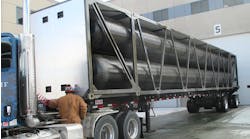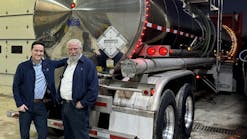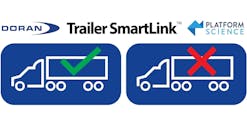Oil producers, truck fleets working together to promote road safety in the oilfield
Tank truck carriers will hear about the latest efforts to improve trucking safety in the oilfield during the National Tank Truck Carriers annual conference April 28-30 in Austin TX. Oilfield topics on the agenda include an update on a joint project to promote increased roadway safety in the booming oil and gas shale regions.
Oil and gas companies joined forces with the trucking industry to promote improved road safety and traffic management in heavily travelled producing areas like the Eagle Ford in south central Texas, the Marcellus region in the Northeast and the Bakken in the upper Midwest. Their latest project is a brochure that discusses road safety recommendations and tips.
NTTC, the American Petroleum Institute, and the American Trucking Associations collected nearly two dozen recommendations for roadway safety and more considerate driving practices. The recommendations will be used as important reminders for member companies and to help develop informational materials on the need to provide safe and responsible trucking operations for the mutual benefit of producers, transporters and the communities in which they operate.
The Houston-based Consumer Energy Alliance (CEA)--a broad-based association comprised of transportation, agriculture, businesses, consumers and energy organizations--launched the initiative in 2012 to seek improved communications about road safety among its membership and the broader public. The recommendations were formally adopted by the parties at a recent meeting in Houston TX.
The recommendations are available online (at http://issuu.com/consumerenergyalliance/docs/trucking_safety_task_force/1 ) and include recommendations to hold frequent meetings with motor carriers to evaluate safety issues, methods for encouraging a culture of safety, techniques to promote access to safety education resources, and practices to properly inform all drivers on the delivery and removal of equipment and materials used during oil and natural gas production. Print copies of the brochure are available through CEA.
For their part, producers are encouraged to monitor and enforce requirements for proof of regulatory compliance by motor carriers and to not hire those with unsatisfactory safety ratings. It is recommended for both transporters and producers to be sensitive to local impacts and, to the extent possible, "schedule deliveries and movements to minimize the traffic impact on local communities.”
“Trucks are the essential workhorses of our country’s ability to take advantage of our shale gas and oil resources to become energy independent,” says John Conley, NTTC past president and Trucking Safety Taskforce co-chair. “It is the trucking industry’s responsibility to provide safe, efficient, and to the extent possible, considerate truck support of this important energy opportunity. We are delighted to partner with the energy industry and the law enforcement community to provide that safe and reliable truck transportation.”
Scheduled to speak at the NTTC annual conference, Conley says road safety is a critical concern in the oilfield. “We want to encourage exploration and production companies to work with good-quality carriers,” he says. “We don’t want to give the anti-oil and gas community additional weapons to stop development of these vital energy resources.”
David Holt, CEA president, adds: "The Consumer Energy Alliance believes that North America has a tremendous opportunity to become energy self-sufficient and spur job creation and growth across the entire US economy and that developing these resources is dependent, in part, on responsible and safe trucking operations. Member companies of these producing and trucking organizations should be applauded for their voluntary and forward-looking action.
“This brochure is part of the discussion that we have initiated by bringing together the various oilfield groups. It is giving us the opportunity to communicate more effectively with the communities located in the oil and gas shale plays. By and large, these communities are in favor of the oil and gas production, and we want to be good neighbors with them.”
Safety is a critical focus for the industry, according to Holly Hopkins, API upstream senior policy advisor. “The industry is committed to protecting our employees, the environment, and the communities where we operate, all while increasing energy security by safely and responsibly developing the energy America needs to fuel its economy,” she says. “API and its members participate in many safety outreach programs and educational outreach on safe driving is an extension of API’s 94-year history of promoting and enhancing safety operations.”
Glen Kedzie, American Trucking Associations vice-president, energy and environmental counsel, says: “Safety remains 'Priority 1' for the trucking industry. Through this collaborative effort of the transportation and energy sectors, along with continued community involvement and education, ATA is confident that these recommendations will go far in improving safety in oil and gas production and exploration transportation activities.”










